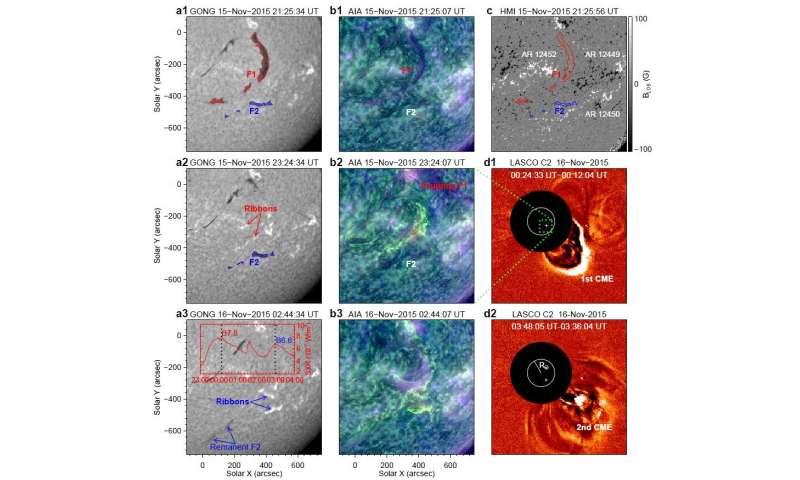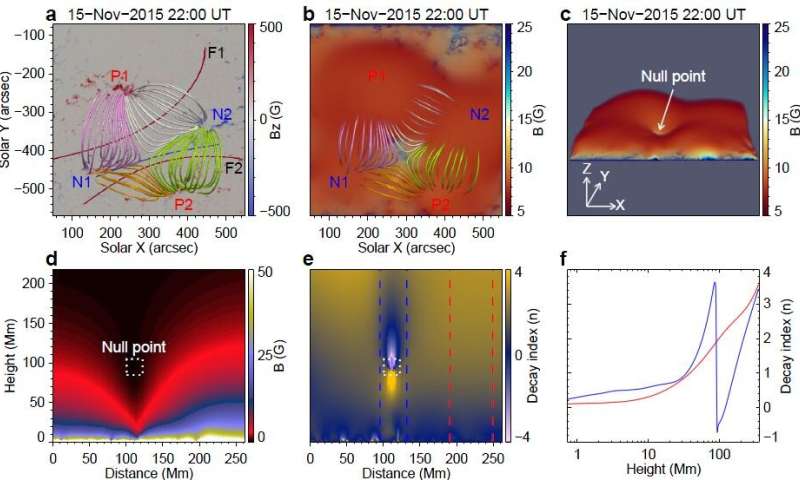
Solar filaments are large magnetic structures confining cool and dense plasma suspended in the hot and tenuous corona.
The sun ubiquitously breeds sympathetic eruptions, which are defined as causally linked eruptions occurring with a relatively short time interval in different, but physically related source regions.
Recent observational and numerical works suggest that the physical linkages between the sympathetic eruptions should essentially be of a magnetic nature. However, the exact physical mechanism of the sympathetic eruptions of two filaments is still not well understood.
Recently, Dr. Hou Yijun from the National Astronomical Observatories of the Chinese Academy of Sciences (NAOC) and his collaborators studied a sympathetic event involving successive eruptions of two filaments (F1 and F2) and revealed a complete physical scenario of the sympathetic eruption.
Relevant results were published in Astronomy & Astrophysics and the Astrophysical Journal, respectively.
The researchers proposed an integrated evidence chain to demonstrate the critical roles of external magnetic reconnection and the resultant reconfiguration of overlying fields on the sympathetic eruptions of two filaments.

"Our observations show that after F1 first erupted due to the magnetic flux cancelation, an inward-spreading brightening and a dimming region were observed to the south of stable F2. The fields above pre-eruption F1 and F2 constituted a quadrupolar magnetic system with a possible null point, and the null point kept moving toward F2 and descending," said Dr. Hou Yijun.
These results indicated that the rising F1 pushed its overlying fields toward the fields above stable F2 and caused successive external reconnection between the overlying fields. From outside to inside (lower and lower in height), the fields above pre-eruption F2 were gradually involved in the reconnection, manifesting as the inward-spreading brightening and extending dimming on the south side of F2.
"Furthermore, the external reconnection could reconfigure the overlying fields of F2 by transporting magnetic flux from its west part to the east part, which is further verified by the subsequent partial eruptionof F2," he said.
The coupling among multiple spatio-temporal solar activities is a basic problem in solar physics, which is closely related to the magnetic field of solar atmosphere and various solar eruptions.
The findings in these two papers further complement the study of sympathetic eruptions of two solar filaments, as well as the relation between filament eruptions and large-scale coronal fields, helping us forecast disastrous space weather.
Y. J. Hou et al. External reconnection and resultant reconfiguration of overlying magnetic fields during sympathetic eruptions of two filaments, Astronomy & Astrophysics (2020). DOI: 10.1051/0004-6361/202038348
Citation: Scientists reveal complete physical scenario of sympathetic eruption of two solar filaments (2020, August 31) retrieved 31 August 2020 from https://ift.tt/2YP8HSV
This document is subject to copyright. Apart from any fair dealing for the purpose of private study or research, no part may be reproduced without the written permission. The content is provided for information purposes only.
"complete" - Google News
August 31, 2020 at 06:39PM
https://ift.tt/2YP8HSV
Scientists reveal complete physical scenario of sympathetic eruption of two solar filaments - Phys.org
"complete" - Google News
https://ift.tt/2Fvz4Dj
https://ift.tt/2YsogAP
Bagikan Berita Ini














0 Response to "Scientists reveal complete physical scenario of sympathetic eruption of two solar filaments - Phys.org"
Post a Comment